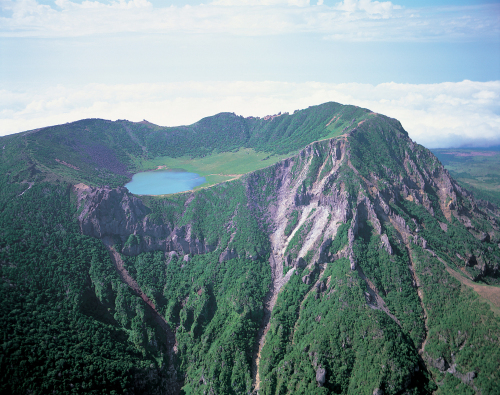Jeju sites named UNESCO global geoparks
이 글자크기로 변경됩니다.
(예시) 가장 빠른 뉴스가 있고 다양한 정보, 쌍방향 소통이 숨쉬는 다음뉴스를 만나보세요. 다음뉴스는 국내외 주요이슈와 실시간 속보, 문화생활 및 다양한 분야의 뉴스를 입체적으로 전달하고 있습니다.
Nine geological sites in Jeju Island were designated as "world geoparks" by UNESCO's Global Geopark Network of National Geoparks (GGN) on Sunday.
At the 9th European Geoparks Conference on the Greek island of Lesvos, the steering committee of GGN officially announced the addition of the nine Jeju attractions to its list of world geoparks.
The nine designated sites are: Mount Halla, Seongsan Sunrise Peak, Manjanggul Cave, Seogwipo stratum, Cheonjiyeon Falls, Jusangjeolli cliffs, Mount Sanbang, Yongmeori Beach and Suwol Peak.
|
|
Manjanggul Cave, along with eight other geological sites in Jeju Island, gained world geopark status from the UNESCO's Global Geopark Network of National Geoparks, Sunday. |
This gives Jeju Island a "Triple Crown" UNESCO designation, along with Mount Halla's Biosphere Reserve recognition in 2002 and Natural Heritage Sites designation of Mount Halla, Seongsan Sunrise Peak and Manjanggul cave in 2007.
Oh Soo-jung, an official from Jeju Special Self-Governing Province, said the world geopark designation has a different meaning compared to the two from the past. "The Biosphere Reserve and Natural Heritage recognition stressed preservation," she said. "So a lot of Jeju residents felt they could not touch or make use of the recognized sites. But this world geopark designation gives a lot of room for development of local economy and tourism, and getting more foreign tourists to the island."
Jeju was also asked to launch Asia-Pacific Geopark Network meeting in 2013, Oh said. "China and countries in Southeast Asia attract many tourists from overseas and Jeju has been thinking of ways to be more competitive," she said. "The 'Triple Crown' UNESCO designation can now be a great resource for the promotion for the island, especially for the international crowd."
|
|
Mount Halla of Jeju Island, UNESCO-designated World Natural Heritage (2007) and Biosphere Reserve (2002), is now a certified world geopark. |
The GGN designations are aimed to promote tourism and conserve natural resources of geological heritage around the world. So far, 66 sites from 21 countries have been certified by UNESCO as world geoparks, including Japan's Unzen Volcanic Area Geopark and Indonesia's Mount Rinjani. Jeju's designation marks the first time for Korea's geological sites to gain world geopark status.
Jeju is planning on providing geology education on the recognized sites to the general public, while promoting them for tourism purposes at the same time.
By Claire Lee (clairelee@heraldm.com)
Copyright © 코리아헤럴드. 무단전재 및 재배포 금지.

